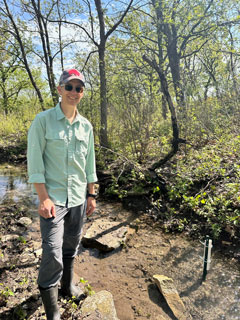June 7, 2024
Matthew Kirk named fellow of Geological Society of America

Matthew Kirk, associate professor in the department of geology, has been named a fellow of the Geological Society of America, or GSA, a global professional organization with more than 26,000 members in 115 countries.
As explained by the society's selection committee, "Society fellowship is an honor bestowed on the best of our profession." It recognizes an individual's sustained contributions to geosciences through research, teaching, public outreach and leadership in the field.
As summarized by Kirk's primary nominator, Professor Pamela Kempton, K-State geology department head, "Matthew Kirk is an outstanding teaching scholar, passionate about environmental sciences, and the pursuit of diversity, equity and inclusion. He is a leader in service to GSA and the profession and renowned for his interdisciplinary research on topics ranging from arsenic contamination in groundwater to microbial generation of natural gas."
Kirk was recognized in 2019 for the excellence of his teaching with the Page Twiss Faculty Development Award for Excellence in Graduate Teaching and Advising. He has been one of the most active mentors on campus in the Kansas Louis Stokes Alliance for Minority Participation, or KS-LSAMP, summer research program. To help promote geoscience education, Kirk recently published an open-access book, "Microbiology for Earth Scientists." Kirk created this resource to show readers, particularly undergraduate students, the importance of microbiology to their field while providing a reference text that is free for all to use.
Kirk is also well known for the interdisciplinarity of his research, most of which is linked to groundwater, including studies on arsenic contamination, microbial generation of natural gas, geological carbon storage, land-use impacts on groundwater quality and responses of aquifer microorganisms to geochemical changes. Of particular note is his work on understanding controls on arsenic mobility in aquifers. Kirk's work showed that arsenic removal by microbial sulfate reduction is the key factor in determining whether dissolved arsenic accumulates to hazardous levels. An implication of the research is that arsenic contamination could be remediated by injecting sulfate into aquifers.
Kirk earned his bachelor's degree from Bradley University, his master's from University of Illinois and a doctorate from University of New Mexico. He was nominated for the Geological Society of America fellowship by four colleagues: Craig Bethke, University of Illinois; Andrea Brookfield, University of Waterloo; Laura Crossey, University of New Mexico; and Pamela Kempton, K-State geology department.
